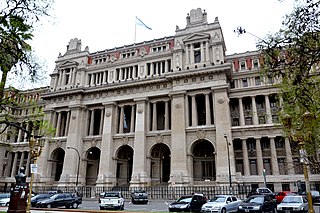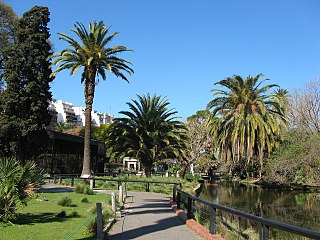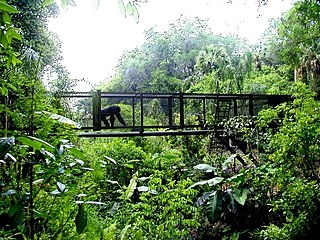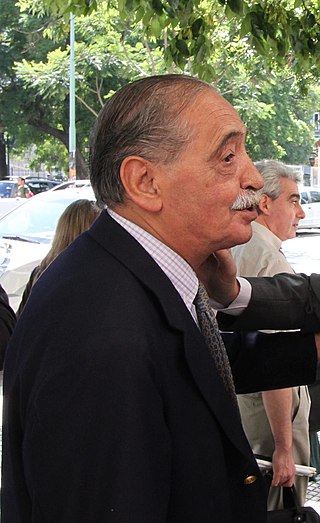Related Research Articles
Habeas corpus is a recourse in law through which a person can report an unlawful detention or imprisonment to a court and request that the court order the custodian of the person, usually a prison official, to bring the prisoner to court, to determine whether the detention is lawful.

Great ape personhood is a movement to extend personhood and some legal protections to the non-human members of the great ape family: bonobos, chimpanzees, gorillas, and orangutans.

The Supreme Court (Filipino: Kataas-taasang Hukuman; colloquially referred to as the Korte Suprema is the highest court in the Philippines. The Supreme Court was established by the Second Philippine Commission on June 11, 1901 through the enactment of its Act No. 136, an Act which abolished the Real Audiencia de Manila, the predecessor of the Supreme Court.
The Constitution of the Argentine Nation is the basic governing document of Argentina, and the primary source of existing law in Argentina. Its first version was written in 1853 by a constitutional assembly which gathered in Santa Fe; the doctrinal basis was taken in part from the United States Constitution. It was then reformed in 1860, 1866, 1898, 1949, 1957, and the current version is the reformed text of 1994. It's the seventh oldest national constitution currently in effect being ratified on May 1, 1853.

The Supreme Court of Argentina, officially known as the Supreme Court of Justice of the Argentine Nation, is the highest court of law of the Argentine Republic. It was inaugurated on 15 January 1863. However, during much of the 20th century, the Court and the Argentine judicial system in general, lacked autonomy from the executive power. The Court was reformed in 2003 by the decree 222/03.

The Buenos Aires Eco Park is an 18-hectare (44-acre) park in the Palermo district of Buenos Aires, Argentina. The former zoo, opened in 1888, contained 89 species of mammals, 49 species of reptiles and 175 species of birds, with a total of over 2,500 animals. The institution's goals are to conserve species, produce research and to educate the public. In June 2016 the city formed a bias about the zoo's cruelty. They had to close the 140-year-old zoo and relocate most of the animals to nature reserves, including Temaikèn. The zoo property will be converted into an ecopark.

The Military Commissions Act of 2006, also known as HR-6166, was an Act of Congress signed by President George W. Bush on October 17, 2006. The Act's stated purpose was "to authorize trial by military commission for violations of the law of war, and for other purposes".
Orangutans have often attracted attention in popular culture. They are mentioned extensively in works of fiction and video games, while some captive individuals have drawn much attention in real life.
Habeas data is a writ and constitutional remedy available in certain nations. The literal translation from Latin of habeas data is "[we command] you have the data," or "you [the data subject] have the data." The remedy varies from country to country, but in general, it is designed to protect, by means of an individual complaint presented to a constitutional court, the data, image, privacy, honour, information self-determination and freedom of information of a person.
In United States law, habeas corpus is a recourse challenging the reasons or conditions of a person's detention under color of law. The Guantanamo Bay detention camp is a United States military prison located within Guantanamo Bay Naval Base. A persistent standard of indefinite detention without trial and incidents of torture led the operations of the Guantanamo Bay detention camp to be challenged internationally as an affront to international human rights, and challenged domestically as a violation of the Due Process Clause of the Fifth and Fourteenth amendments of the United States Constitution, including the right of petition for habeas corpus. On 19 February 2002, Guantanamo detainees petitioned in federal court for a writ of habeas corpus to review the legality of their detention.
In the Philippines, amparo and habeas data are prerogative writs to supplement the inefficacy of the writ of habeas corpus. Amparo means 'protection,' while habeas data is 'access to information.' Both writs were conceived to solve the extensive Philippine extrajudicial killings and forced disappearances since 1999.
In most legal systems of the Spanish-speaking world, the writ of amparo is a remedy for the protection of constitutional rights, found in certain jurisdictions. The amparo remedy or action is an effective and inexpensive instrument for the protection of individual rights.
The history of human rights in Argentina is affected by the Dirty War and its aftermath. The Dirty War, a civic-military dictatorship comprising state-sponsored violence against Argentine citizenry from roughly 1976 to 1983, carried out primarily by Jorge Rafael Videla's military government. However, the human rights situation in Argentina has improved since.

The Center for Great Apes is a sanctuary for great apes located east of Wauchula, Florida. Its mission is to provide a permanent sanctuary for orangutans and chimpanzees who have been rescued or retired from the entertainment industry, from research, or from the exotic pet trade; to educate the public about captive great apes and the threats to conservation of great apes in the wild; and to advocate for the end of the use of great apes as entertainers, research subjects, and pets.

Julio César Strassera was an Argentine lawyer and jurist. He served as Chief Prosecutor during the Trial of the Juntas in 1985.
Personhood is the status of being a person. Defining personhood is a controversial topic in philosophy and law and is closely tied with legal and political concepts of citizenship, equality, and liberty. According to law, only a legal person has rights, protections, privileges, responsibilities, and legal liability.

The Nonhuman Rights Project (NhRP) is an American nonprofit animal rights organization seeking to change the legal status of at least some nonhuman animals from that of property to that of persons, with a goal of securing rights to bodily liberty and bodily integrity. The organization works largely through state-by-state litigation in what it determines to be the most appropriate common law jurisdictions and bases its arguments on existing scientific evidence concerning self-awareness and autonomy in nonhuman animals. Its sustained strategic litigation campaign has been developed primarily by a team of attorneys, legal experts, and volunteer law students who have conducted extensive research into relevant legal precedents. The NhRP filed its first lawsuits in December 2013 on behalf of four chimpanzees held in captivity in New York State. In late 2014, NhRP President Steven Wise and Executive Director Natalie Prosin announced in the Global Journal of Animal Law that the Nonhuman Rights Project was expanding its work into other countries, beginning in Switzerland, Argentina, England, Spain, Portugal, and Australia.

Transgender and travesti rights in Argentina have been lauded by many as some of the world's most progressive. The country "has one of the world's most comprehensive transgender rights laws": its Gender Identity Law, passed in 2012, made Argentina the "only country that allows people to change their gender identities without facing barriers such as hormone therapy, surgery or psychiatric diagnosis that labels them as having an abnormality". In 2015, the World Health Organization cited Argentina as an exemplary country for providing transgender rights. Leading transgender activists include Lohana Berkins, Diana Sacayán, Mariela Muñoz, María Belén Correa, Marlene Wayar, Claudia Pía Baudracco, Susy Shock and Lara Bertolini.
The judiciary of the Philippines consists of the Supreme Court, which is established in the Constitution, and three levels of lower courts, which are established through law by the Congress of the Philippines. The Supreme Court has expansive powers, able to overrule political and administrative decisions, and with the ability to craft rules and law without precedent. It further determines the rules of procedure for lower courts, and its members sit on electoral tribunals.
References
- ↑ Unknown (2015-10-25). "the intimate ape: Read the judge's decision that the orangutan Sandra is a "non-human person"". the intimate ape. Retrieved 2019-07-03.
- ↑ Stephen Messenger (December 22, 2014). "HISTORIC: Court Rules Zoo Orangutan Has Right to Freedom". The Dodo. Retrieved September 8, 2015.
- ↑ BBC online (December 23, 2014). "Orangutan given right to freedom in Argentina" . Retrieved September 8, 2015.
- ↑ Shawn Thompson, Supporting Ape Rights: Finding the Right Fit Between Science and the Law. ASEBL Journal January 2019, Volume 14, Issue 1
- ↑ decision of the appellate court of Buenos Aires
- ↑ Unknown (2015-10-25). "the intimate ape: Read the judge's decision that the orangutan Sandra is a "non-human person"". the intimate ape. Retrieved 2019-07-03.
- ↑ decision of the appellate court of Buenos Aires
- ↑ Time magazine
- ↑ Center for Great Apes Welcomes Sandra to the Sanctuary, PR Newswire